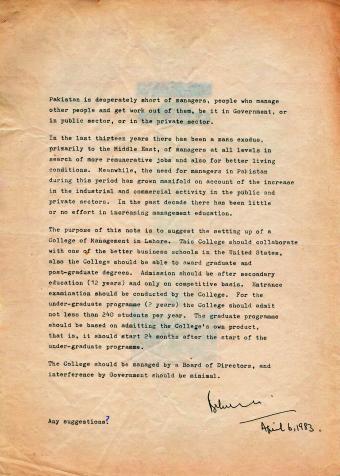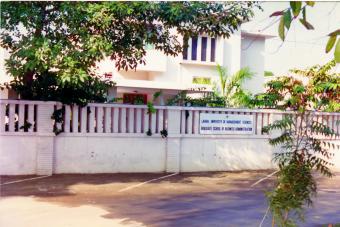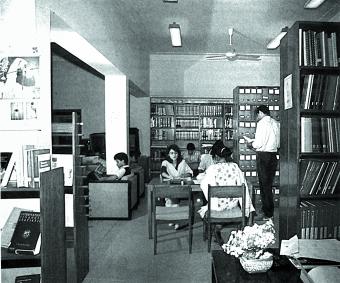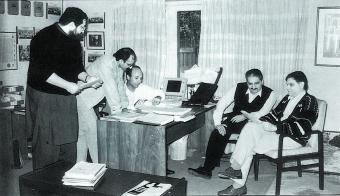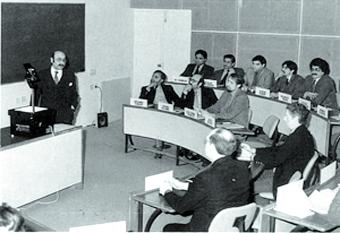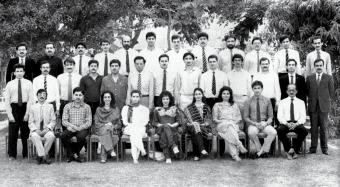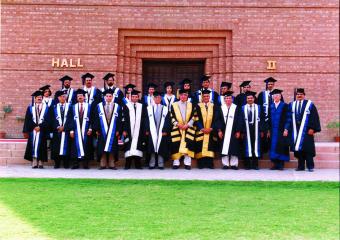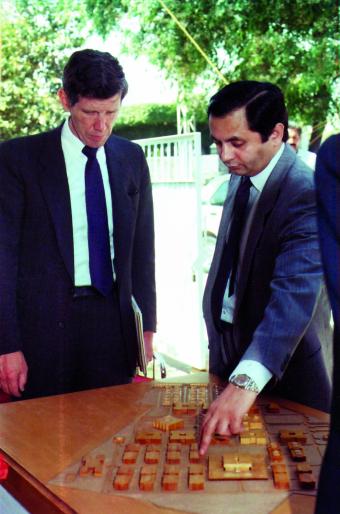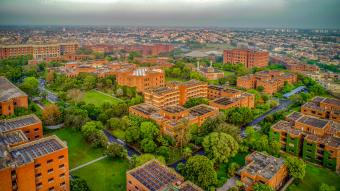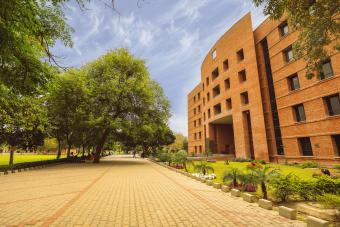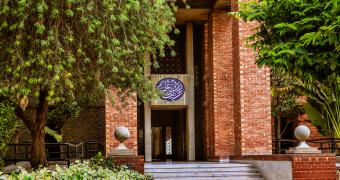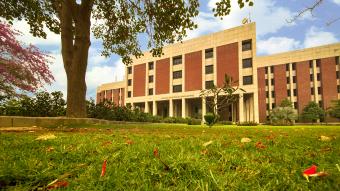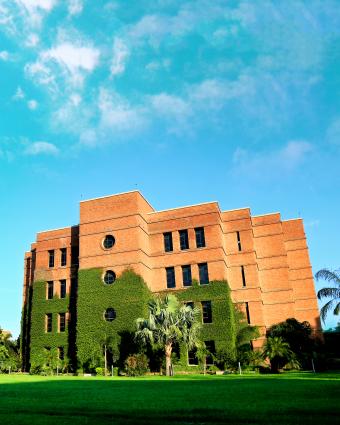Our History
The LUMS community is driven by a shared purpose: to make a better world by providing an inclusive space to students from all segments of society to work on groundbreaking ideas and conduct socially relevant research with exceptional faculty. Explore our timeline to view some of the highlights of the past three decades.
- The Beginning
In 1983, Syed Babar Ali, a renowned businessman in Pakistan, recognised the shortage of qualified managers in the country. He proposed to establish a world-class university that would attract and retain the highest caliber of students and faculty. He shared his idea with fellow businesman and close friend, Abdul Razak Dawood, who was in full support of the vision.
Syed Babar Ali met with Pakistan's then President, General Zia-ul-Haq, and invited him to be the first patron of the institution. He immediately expressed his approval and consent.
1984: A group of founding members was assembled who went on to establish the National Management Foundation (NMF) – the fundraising body of the institution
1985: The University was granted a charter - Founding Values
From the very beginning, hard work, dedication and integrity were the thrust for all activities. The founding members built LUMS on the values of commitment to excellence, and a merit based approach. These values still drive LUMS today. From the early days of the University, all members of the community were held to the highest standards. With limited resources and exceptional motivation, the University began its operations in a small rented bungalow.
1986: Syed Babar Ali appointed as Pro Chancellor
1986: Abdul Razak Dawood appointed as Rector
1986: Dr. Jan-Erik Vahlne appointed as Associate Dean - Bringing Inmagic Software to Pakistan
In 1987 the LUMS Library became the first library in Pakistan to computerise its holdings and services using Inmagic software.
At the time, a computerised library was radically progressive and unheard of locally. When the University's first librarian joined the team, she drafted a letter to schools around the world asking for guidance in building a substantial business library. The response was extremely encouraging: libraries from across the globe sent the details of their journals, subscriptions and collection particulars.
- Pioneering the Case Methodology
LUMS introduced the case based methodology of teaching in Pakistan. This model utilises real life situations and allows students to be active participants in their own learning, and strongly differs from the traditional lecture based technique.
Aware of the significance of utilising good case studies, the pioneers of the institution obtained permission to use the 1985 core collection of cases from the Harvard Business School. - The Honour System
Since the early days, integrity was a part of the culture of the University. The initial batches of students proposed an Honour System, where there should be no faculty invigilation in exams and the class would regulate itself.
"People say that the Honour System was a hallmark of those days, but I feel it was not a hallmark, it was a byproduct. When the vision for the students is 'leaders of tomorrow' then everything changes. We all used to take exams in the garden outside and we used to sit together, no faculty member was there"
Arif Nazir Butt
Class of '89 - A New Era
In 1989, Syed Babar Ali and the US Ambassador signed the USAID grant of USD 10 million, to be utilised for campus construction. The architect, Habib Fida Ali, toured universities in Iran, India, America and Scandinavia to observe the infrastructure of different business schools.
1991: Construction for new campus begins
1992: Board of Trustees gives go-ahead to a new undergraduate programme
1993: New 100 acre campus built in DHA, Lahore
1993: 689 hopefuls apply to be part of the first batch of undergraduates
1994: The first batch of 65 undergraduate students step onto the campus - Suleman Dawood School of Business
What began as an institution with a world-class MBA programme grew to become a comprehensive business school, offering degrees at the undergraduate and graduate levels.
2002: Dr. Ehsan Ul Haque appointed as the Dean of the Business School
2002: Executive MBA programme launched to facilitate managers and entrepreneurs
2004: The Business School renamed as the Suleman Dawood School of Business (SDSB)
2006: PhD Management added to the list of doctoral programmes offered
2011: SDSB Business launches a BSc in Management Science
2019: SDSB receives AACSB accreditation - Mushtaq Ahmad Gurmani School of Humanities and Social Sciences
2003: A five year, integrated, BA-LL.B degree launched by the School of Arts and Sciences (SoAS)
2006: SoAS renamed as School of Humanities, Social Sciences and Law
2007: Law programme approval received from Pakistan Bar Council (PBC)
2008: First batch of 17 students graduate from the Law programme
2009: BA (Honours) in Humanities introduced and a BSc (Honours) in Anthropology/Sociology and Political Science launched.
2010: Mushtaq Ahmad Gurmani Centre established by the Gurmani Foundation
2011: SoAS launches a BA (Honours) in History
2012: SoAS renamed as the Mushtaq Ahmad Gurmani School of Humanities and Social Sciences (MGSHSS)
2012: Minors introduced in the following disciplines: Anthropology/Sociology, Economics, English, History, Philosophy, Political Science, Biology, Chemistry, Computer Science, Mathematics and Physics
2013: MGSHSS launched a BA (Honours) in English and a minor in Psychology - Syed Babar Ali School of Science and Engineering
In 2002, Syed Babar Ali began floating the idea of a science and technology venture under the LUMS banner. Over the next few years, the concept grew from an idea to a tangible project. Today, the School offers a number of undergraduate and graduate degrees.
2006: Groundbreaking ceremony for the School of Science and Engineering takes place
2008: Classes commenced in the still under-construction School of Science and Engineering building
2011: The School of Science and Engineering building inaugurated
2012: First batch from the School graduates
2012: School of Science and Engineering renamed as the Syed Babar Ali School of Science and Engineering
2012: MS degree in Electrical Engineering introduced along with new doctoral programmes in Biology, Chemistry, Electrical Engineering, and Physics - Shaikh Ahmad Hassan School of Law
LUMS had already been offering a comprehensive BA-LL.B degree since 2002. The intention to have a separate law school was already there, and in 2013 the launch of the Shaikh Ahmad Hassan School of Law was officially announced.
2002: Approval granted by the Board of Trustees to start work on the establishment of a law school
2003: First batch of law students inducted
2003: B.A.-LL.B classes commenced
2008: First batch graduates
2015: Law degree approved as an ‘Honours’ degree by Pakistan Bar Council (PBC)
2015: Shaikh Ahmad Hassan School of Law inaugurated - Syed Ahsan Ali and Syed Maratib Ali School of Education
With the aims to carry forward the LUMS vision and play a vital role in producing education leaders, policymakers, and related specialists who are strongly rooted in research thinking, the Syed Ahsan Ali and Syed Maratib Ali School of Education was inaugurated.
2016: The School of Education (SOE) announced
2017: Dr. Tahir Andrabi appointed as the inaugural Dean
2018: The School of Education renamed as the Syed Ahsan Ali and Syed Maratib Ali School of Education
2018: The School of Education welcomes the inaugural MPhil Education Leadership and Management class

